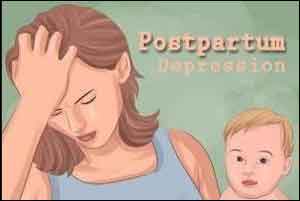- Home
- Editorial
- News
- Practice Guidelines
- Anesthesiology Guidelines
- Cancer Guidelines
- Cardiac Sciences Guidelines
- Critical Care Guidelines
- Dentistry Guidelines
- Dermatology Guidelines
- Diabetes and Endo Guidelines
- Diagnostics Guidelines
- ENT Guidelines
- Featured Practice Guidelines
- Gastroenterology Guidelines
- Geriatrics Guidelines
- Medicine Guidelines
- Nephrology Guidelines
- Neurosciences Guidelines
- Obs and Gynae Guidelines
- Ophthalmology Guidelines
- Orthopaedics Guidelines
- Paediatrics Guidelines
- Psychiatry Guidelines
- Pulmonology Guidelines
- Radiology Guidelines
- Surgery Guidelines
- Urology Guidelines
Screen women for depression once during pregnancy : AAP Policy statement

Screen women for depression once during pregnancy is one of the recommendations of the AAP Policy statement on the recognition and management of perinatal depression into pediatric practice.
The American Academy of pregnancy,(AAP) has released its updated policy statement which will be published in the January 2019 issue of Pediatrics. In the statement, it renews its call for physicians to screen women for depression during and after pregnancy and details the health implications for children. The policy addresses the pediatric primary care clinician’s role in identifying PPD and referring the mother-infant dyad for treatment, along with advocacy opportunities. The technical report reviews the epidemiology of perinatal depression, including the need for recognition among fathers, and evidence regarding the effects of perinatal depression, screening, and treatment.
Read Also: Women giving birth to boys more prone to postpartum depression
The policy statement and an accompanying technical report .
PPD, included under perinatal depression(PND), is an adverse childhood experience that can impact early brain development, and the health and well-being of the child, mother, and family.
An estimated 50 percent of women who are depressed during and after pregnancy are undiagnosed and untreated. When left untreated, perinatal depression can hinder bonding and healthy attachment, distort perception of the infant’s behavior and impair the mother’s attention to and judgment concerning safety.
AAP recommends that mothers are screened for depression once during pregnancy and that pediatricians screen mothers during the infant’s well visits at 1, 2, 4 and 6 months of age. Pediatricians are also encouraged to work with prenatal health providers to identify systems of support for the patients and identify community resources and also support the mother-infant dyad relationship, including providing breastfeeding support.
Read Also: Pain following childbirth cause of Postpartum depression
Screenings for PPD at infant visits are an opportunity for engagement and promotion, even if results are not concerning. When a screen is positive, primary care intervention and support are effective, even if the referral is planned. When depression is identified, follow-up includes the screening of social-emotional development for the infant.
Before implementing PPD screening at infant visits, it is essential to have knowledge of support and referral resources, and a plan to link families to them. This includes mental health professionals who care for infants and young children, and who offer evidence-based dyadic therapies such as child-parent psychotherapy.
"Emerging research also has begun to examine the importance and influence of a father’s emotional state on a child’s early development and well-being. “Fathers also experience a high rate of postpartum depression and need to be supported, identified and referred for treatment,” said Michael Yogman, MD, FAAP, the coauthor of the study.
For full information log on to https://www.aap.org/en-us/about-the-aap/aap-press-room/Pages/Infants-Family-Are-Affected-by-Mothers-Perinatal-Depression.aspx

Disclaimer: This site is primarily intended for healthcare professionals. Any content/information on this website does not replace the advice of medical and/or health professionals and should not be construed as medical/diagnostic advice/endorsement or prescription. Use of this site is subject to our terms of use, privacy policy, advertisement policy. © 2020 Minerva Medical Treatment Pvt Ltd